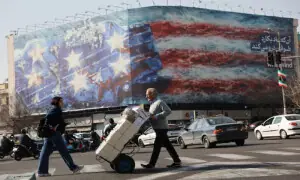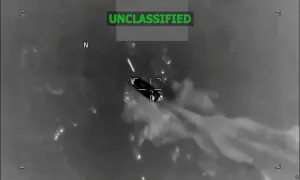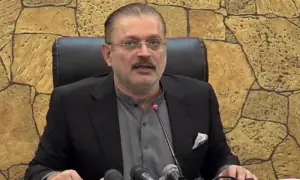What 10 days of relief work looked like in Khairo Dero
11 min readNaween Mangi has been running her family’s Ali Hasan Mangi Memorial Trust in Khairo Dero, outside Ratodero for years, mainly providing health, education, housing and livelihood support. When the floods hit, the team was overwhelmed with desperate families arriving at their community centre but they managed to get organised quickly. Aaj News asked her to describe what happened and how their relief work is unfolding. She sent a series of voice notes which were transcribed below.
My brain is so scattered and I’ve been at it 19 hours a day… it’s really… And the thing that is really getting to me is that I don’t have stable internet, I don’t have stable mobile service, I don’t have stable electricity. Our entire solar electricity system collapsed during the rains. That hasn’t been repaired yet. We have a generator but we can’t use it 24 hours a day. So it’s just that part that has been really hard for me, because the donations are rolling in. I need to do so much back-end work, as well as dealing with the public and these surveys done and stuff. So it’s been really frustrating.

When the waters came
On the night of August 21, there was a sudden inundation in village Garhi Harsa. There had been rain there obviously for days and people were in standing water, but there was a sudden inundation, a sudden flooding. Dozens of families came walking to our community centre that night and it really was a scene to see, because they were coming crying from the road, dragging their children, somebody was able to bring a rilli, someone was able to bring one pair of clothes, somebody was not able to bring anything at all…
These communities have been through something like this for the first time because it 2010 this area did not flood
You saw these women coming up the road, wailing and screaming, drenched. It was a massive storm in progress, so they were completely drenched through and through. Many of them had infants who were days old and they had wrapped them in all kinds of things and were clutching against their chests. It was completely surreal.
These communities have been through something like this for the first time because it 2010 this area did not flood. So they have never seen anything like this before.

That night our team had to urgently prepare for shelter and food. Simultaneously we had two villages go through this, Garhi Harsa and Ghous Buksh Umrani – both villages were completely inundated. Ghous Bukhsh Umrani is still so inundated that you can’t see anything except water and even the road is flooded.
Our initial task was to provide shelter, food and medical care keeping in mind the cultural sensitivities and social structure we had to keep both communities apart from each other because otherwise there could have been all kinds of other issues. So we used several of our rooms and separated both of them so that they would not be in the same place.
Our aim was to provide comfort, physical comfort first and then as much emotional and mental as much as our entire team could. My team of about 20 to 25 have been on their feet for the last ten days, day and night. I’ve never seen such dedication really honestly in my life.

The missing children
We also had volunteers from the community, so we began cooking for all these people. We provided them a hot meal that night, clean water. We were not able to provide dry clothing, which I wish we could have. We were at least able to provide them a a dry space, which at that time for them. They were just so grateful to be in a dry space because their homes had collapsed, had been washed away. Their belongings had been washed away. Their livestock had been washed away.
Some people were telling me that they brought their toddlers, but their older children who were nine, ten years old were separated. It’s a fairly long walk. So the very next morning, the women were very anxious, so we sent out teams to these villages to go and recover the children and reunite these families.
So for these ten days, our goal while these people were housed with us, was to feed and care for them. I spent a lot of time just talking with the women late in to the night, to, you know, provide a bit of a laugh, a little bit of a sharing of the heart. I mean … it was heart-breaking to see their conditions. They needed little things like detergent, or washing soap. All those giraffes, horses, fountains… everything was covered with rillis and children’s clothing that was washed. They were struggling to wash whatever they had and to dry it. We got detergent and soap in massive quantities.

Medical priorities
Our aim was and still is to procure what we need locally. That helps boost local businesses who are already in so much trouble. It’s also cheaper, quicker, less damaging to the environment, less clogging of the highways. I don’t know why more people aren’t doing that.
People had terrible terrible skin rashes that were burning and itching on their feet and lower legs caused by standing for prolonged times in stagnant muddy water
Immediately it was apparent that there were certain medical problems that all types of flood victims were facing. One was Diarrhea among small children, malaria in adults, chest infections, and especially these terrible terrible skin rashes that were burning and itching on their feet and lower legs caused by standing for prolonged times in stagnant muddy water.

I immediately got dozens and dozens of antibiotic creams and I had my staff put on gloves and go from person to person applying these antibiotic creams twice a day to all the residents. These people were telling us that for the days they stayed at their houses they had not slept for nights because of the severe burning and itching but they were able to get immediate relief from the medication.
We took care of about 700 patients in the acute phase, and we are continuing to run a free daily clinic. We have restocked the entire clinic to reflect the needs of the flood-related problems. A physician comes, evaluates and gives free medication for people from everywhere. We plan to continue to do this.

Marshalling cooks, immediate family help
We fed about 5,000 hot meals to people not just at the community centre but at the government schools in Khairo Dero, to people sitting on the roads, to people in villages as far as Kundan Singh, which is in district Kamber Shahdadkot, villages in Sujawal, such as Jamal Khan Leghari. In these initial days.
Daily wagers got an immediate Rs5,500 ($25) cash handout and ration bags. Many are headed home to sit on any dry patch of land. Once they have a month’s food supply they are happy to go back
Then in Khairo Dero we did an immediate cash transfer of Rs5,000 per family for a 100 families. In this what we were looking at was not that their house had collapsed, but that daily wagers who did not have the opportunity to earn a living for several days now, their families were now going hungry. Organising rations also takes time. So until we could do that we did this immediate cash transfer to a hundred daily wagers. And that took the pressure off some of these people.
Now from today we have started the dry ration run. And by the end of tomorrow we should have distributed about 450 ration bags to families which is a major step in rehabilitating them. So communities are now heading out of here and are going back home to sit on any dry patch of land and they can get what they want close to home. The only major obstacle in that is food. So once they have a month’s food supply they are happy to go back home and live in whatever conditions they can until things get better.
Start rebuilding asap
The major task ahead is the reconstruction and repair of homes. We are getting hundreds of applications a day. People are breaking down our doors. I had teams out in 12 different villages yesterday, surveying. I can send pictures of the destruction. It is absolutely colossal. And that is going to be the major task ahead. What worries me is that right now there is an outpouring of sympathy and compassion. Everyone is donating. We are being inundated with more funds than we have ever had.
But I fear that once the media hype dies down and once there is less news, once the initial fervour dries up, then the funds will dry up too. And the funds will be needed then, once this immediate emergency relief is over the rehabilitation is what is going to really cost money. Feeding a family for a month costs only Rs5,500 ($25) but helping repair or rebuild a home is going to cost a lot lot more than that.

We have not wasted any time despite the fact that we are so short staffed, what I have done is the teams who were out surveying for rations yesterday, I simultaneously had them do housing surveys as well. So we are building up our lists of who needs what types of help to repair their homes or rebuild and we are actually going to start doing that this month.
So we are building up our lists of who needs what types of help to repair their homes or rebuild and we are actually going to start doing that this month.
So in Khairo Dero itself, the area is relatively dry and reconstruction can begin, so we are going to start that wherever we can. And that is where we really want people to come forward and help.

I think everyone should take a moment to think about people like my staff who are out in the field, who have not been home for days despite the fact that their home is a minute away. Who are just working round the clock, who are exhausted, who themselves have those skin rashes on their feet.
Without people like this… they are paid Rs25,000… I think without people like these, they are out in the sun all day. They were drenched and were wearing the same pair of clothes for three days – without people like this there would be no one to help our fellow citizens. I think we should take a moment to really thank them as well.
Women’s health: sanitary pads and pregnancies
We already talked about the sanitary pads. Other communities may have different opinions or perhaps exposure or access to these things. But certainly in the very katcha communities where I work, women would not know what to do with a sanitary pad, they would probably use it for something completely different. And providing people with things like bottled water makes no sense to me because they are not going to have access to bottled water later on.
In areas like ours, where we have groundwater coming from 100 feet, there is no issue of contamination, the water is fine. But in other areas where people are having issues, the may be needing drinking water, so perhaps purification tablets and awareness of those are better than for example providing bottled water.
I forgot to mention pregnant women and women with stress and anxiety. In our initial, when we housed people initially, we went around looking for all the pregnant women and loaded them up with iron and vitamins, made a special effort to make sure they had elevated places like benches to sleep on, if they were uncomfortable on the floor and had more space around them, so that they would not be uncomfortable. That was a really big priority for us.
Also women who had recently, just a day or two before they were evacuated had been through cesareans or other type of gynae surgery who needed more comfort, needed more space, a check up by our doctor. We were able to provide all of that. There was so much anxiety among women about having to leave their houses, having lost their houses, we did try to take care of that as much as we could as well.
How can people help: listen first

The closer one is to communities, the longer the experience one has had interacting with them, the more time one spends with communities affected right now, the more one will understand what they need. They are the best ones to decide what they need. They are very good at communicating that clearly. We have to listen.
I think for people in the cities especially, who are so well-meaning, but perhaps don’t have enough intelligence on the ground they must ask people like us who are deeply connected to the communities, talking late into the night every day – understanding what people want is the most important part of this entire process. I have seen relief workers coming here with packets of biscuits, with medication from the worst of companies, with little pieces of tarpaulin sheets which are no good to anyone… You know all of this has cost money, this waste of resources is something that does concern me.
We need all the resources we can get right now, I would say more than feeding people but to rehabilitate them in their homes, to rebuild all of this shelter. The feeding, as I said, is not that expensive and people are giving so much that it will be accomplished.
The rehabilitation is what worries me.
For the latest news, follow us on Twitter @Aaj_Urdu. We are also on Facebook, Instagram and YouTube.























Comments are closed on this story.